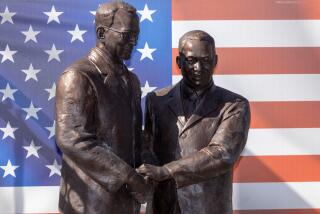Kenny and Harry: Two Uncommon Men
- Share via
A while ago, I heard Abba Eban speak about his first encounter with Harry Truman, and it reminded me of my former boss, Kenny Hahn, whose extraordinary heart finally wore out this week.
Eban related what it was like to sit in the Oval Office back in 1949 and have a conversation with that rather ordinary-seeming Most Powerful Man in the World. Actually, the conversation was apparently one-way, as Truman offered anecdotes of his presidency, mostly focusing on the decision to drop the bomb on Hiroshima. After Eban’s time was up, the next visitor was ushered in. As Eban exited, through the door he was able to hear Truman regaling his new audience with stories about his presidency, mostly focusing on the decision to drop the bomb on Hiroshima.
Eban’s tale rang oh so true. For 10 years, I worked for the rather ordinary-seeming Kenny Hahn who, as a member of the Los Angeles County Board of Supervisors, was one of the most powerful men in California, if not the nation. I can’t begin to count how many times I heard him tell the stories of how he coaxed Walter O’Malley to bring the Dodgers to Los Angeles, how he got Pat Brown to let him install call boxes on the freeways, how he shamed his fellow board members into authorizing funds for Martin Luther King Jr. Hospital, how he challenged the medical establishment to allow the county to establish the nation’s first paramedic unit.
I was privileged to witness some of Kenny’s stories as they happened: how in 1980 he single-handedly passed Proposition A, the only transit tax ever to be approved by L.A. County voters; how he built parks complete with fishing lakes on property in Watts and Baldwin Hills that any other politician would have sold off to developers; how he helped break through the decades-long deadlock to get the Century Freeway built; how he defied Metro Rail lobbyists and literally railroaded through the Long Beach-to-downtown L.A. light rail line; how he got the Legislature to pass and the governor to sign the “Rob a home, go to jail” law because he was sick of seeing law-abiding citizens imprison themselves with bars on their windows.
The stories were endless. And they were real. Just like Truman, Kenny had an enormous list of accomplishments. Just like Truman, Kenny had unquestioned integrity. And just like Truman, Kenny always had time to tell everyone and anyone the stories of what he had done and how he had done it.
Then, just like Truman, when Kenny finally left office, he returned to his unassuming home where he had lived for years with the wife who was his strength. Harry had Bess. Kenny had Ramona.
Both men were masters of democratic leadership. They marched to their own drummers but were in tune with the will of the people. To Kenny, they weren’t “the electorate” or “the voters.” They were his friends, his neighbors. He knew them and they knew him. This is why he was that rare breed: a white officeholder to be overwhelmingly elected over and over by a mostly minority constituency.
One of the stories that Kenny loved to tell was about the first time he met Harry Truman. Truman was on his famous campaign whistle stop tour of 1948. Kenny was the only L.A. councilman who was willing to deliver an official city welcome to the president, who everyone was certain was headed for defeat. One year later, President Truman returned to Los Angeles and was greeted by, a tumultuous crowd. Truman searched out Kenny and said to him, “I don’t remember all these people being here last time!”
I suspect that Harry and Kenny are having quite a reunion right now. I can just picture it. Harry is telling Kenny about dropping the bomb on Hiroshima and Kenny is telling Harry about putting call boxes on the freeways. And no one else is getting a word in edgewise.
Harry and Kenny. The common man as leader, the leader as common man. I was lucky enough to know one of them, and to hear him tell his stories. Now their lives are stories we all would do well to tell.
More to Read
Sign up for Essential California
The most important California stories and recommendations in your inbox every morning.
You may occasionally receive promotional content from the Los Angeles Times.













